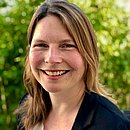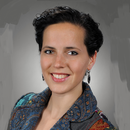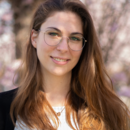“I am delighted that thanks to the Hopp Children’s Tumor Center, the chances of recovery for severely ill children are being further improved. The Heidelberg University Hospital and the German Cancer Research Institute are continuing Heidelberg’s success story in oncology,” said Science Minister Theresia Bauer. Bauer went on to say that the fact that such fantastic projects like the KiTZ were initiated in Heidelberg, well-known for its medical research, confirms the high level of excellency as well as the great potential of local conditions – “and that we have set the right course in the past few years.” Bauer said many thanks were due to those who made this project possible by their generous donations.
Clinic, Translation, Preclinic – the three pillars of the KiTZ
The goal of the KiTZ is to help children with cancer more effectively by using new diagnosis and therapy methods. “In the future, we would like to also give those children a chance for whom cancer returns or for whom there was previously barely a chance for recovery,“ said the directors of the KiTZ, the professors Andreas Kulozik, Olaf Witt, and Stefan Pfister during their opening speech. “The foundation for that is excellent and comprehensive care for our patients. Beyond that, we must expand our research – particularly in the preclinical and translational area.”
“Translation” in medicine means the transfer of research results into clinical applications. And that is precisely what the main focus of the KiTZ will be. The opposite is just as important: taking observations from the clinic and applying them back to research. The KiTZ directors are confident: “With this focus we will be able to develop new diagnosis and therapy possibilities for patients with cancer recurrence.”
In order to improve the chances in child oncology, new concepts are essential. Even though four out of five children with cancer can be treated successfully ̶ for 20 percent there is currently hardly any chance of permanent recovery. Professor Dr. Michael Baumann, the chairman and science chair of the DKFZ stresses: “In order to give these children and their parents new hope, we need better diagnosis and therapy methods. We can only achieve this if we take the excellent child-specific cancer research in Heidelberg and apply it fully in the KiTZ.”
Clinic and research are growing together in the new KiTZ building
Just how important the convergence of clinic and research is, is shown by the joint decision by the Heidelberg University Hospital and the German Cancer Research Institute (DKFZ) to combine both in their own new building in the very near future. Both partners are doing this in order to make the cooperation of everyone involved in Heidelberg’s child oncology much easier – something which will benefit the whole area. “The new KiTZ building will combine medical and scientific expertise in the field of child oncology and therefore strengthen Heidelberg’s medical campus,” said Professor Dr. Wolfgang Herzog, the dean of the medical faculty of Heidelberg. The new building will cost around 40 million Euros. The Dietmar Hopp Foundation is providing half of the sum, while another 10 million Euros are covered by other supporters. “We are looking for further donors for the remainder of the costs,” said Herzog about the current funding gap of about 10 million Euros.
Symposium promotes networking amongst child oncologists
With a symposium taking place in the Print Media Academy Heidelberg on January 19 and 20 2017, the KiTZ wanted to promote the networking of researchers and clinicians at the highest level: At the “1st KiTZ Symposium on Pediatric Oncology and Hematology” renowned speakers from across the world were presenting their research and medical applications in the field of child oncology on the topics of genomic and epigenomic research, tumor heterogeneity and resistance mechanisms, disease-models, precision oncology, hematology, immunotherapy and radiation therapy. Journalists are welcome to attend the symposium.
* The NCT was founded in Heidelberg in 2004 as the first "Comprehensive Cancer Center" in Germany in cooperation with the German Cancer Research Center and Heidelberg University Hospital.
About us
The “Hopp Children's Cancer Center at NCT Heidelberg” (KiTZ)
The „Hopp Children's Cancer Center at the NCT Heidelberg” (KiTZ) is a joint institution of the Heidelberg University Hospital and the German Cancer Research Center (DKFZ). As a therapy and research center for oncologic and hematologic diseases in children and adolescents, the KiTZ is committed to scientifically exploring the biology of childhood cancer and to closely linking promising research approaches with patient care– from diagnosis to treatment and aftercare. Children suffering from cancer, especially those with no established therapy options, are given an individual therapy plan in the KiTZ, which is created by interdisciplinary expert groups in so-called tumor boards. Many young patients can participate in clinical trials which ensures access to new therapy options. Thus, the KiTZ is a pioneering institution for transferring research knowledge from the laboratory to the clinic.
Heidelberg University Hospital and Medical Faculty:
Internationally recognized patient care, research, and teaching
Heidelberg University Hospital is one of the largest and most prestigious medical centers in Germany. The Medical Faculty of Heidelberg University belongs to the internationally most renowned biomedical research institutions in Europe. Both institutions have the common goal of developing new therapies and implementing them rapidly for patients. With about 12,600 employees, training and qualification is an important issue. Every year, around 66,000 patients are treated on a fully or partially inpatient basis and over 1,000,000 patients have been treated on an outpatient basis in more than 50 clinics and departments with 1,900 beds. Currently, about 3,500 future physicians are studying in Heidelberg; the reform Heidelberg Curriculum Medicinale (HeiCuMed) is one of the top medical training programs in Germany.
The German Cancer Research Center (DKFZ)
The German Cancer Research Center (Deutsches Krebsforschungszentrum, DKFZ) with its more than 3,000 employees is the largest biomedical research institute in Germany. At DKFZ, more than 1,000 scientists investigate how cancer develops, identify cancer risk factors and endeavor to find new strategies to prevent people from getting cancer. They develop novel approaches to make tumor diagnosis more precise and treatment of cancer patients more successful. The staff of the Cancer Information Service (KID) offers information about the widespread disease of cancer for patients, their families, and the general public. Jointly with Heidelberg University Hospital, DKFZ has established the National Center for Tumor Diseases (NCT) Heidelberg, where promising approaches from cancer research are translated into the clinic. In the German Consortium for Translational Cancer Research (DKTK), one of six German Centers for Health Research, DKFZ maintains translational centers at seven university partnering sites. Combining excellent university hospitals with high-profile research at a Helmholtz Center is an important contribution to improving the chances of cancer patients. DKFZ is a member of the Helmholtz Association of National Research Centers, with ninety percent of its funding coming from the German Federal Ministry of Education and Research and the remaining ten percent from the State of Baden-Württemberg.
Media contact:
Dr. Elke Matuschek
„Hopp Children`s Cancer Center at the NCT Heidelberg“ (KiTZ)
Manager Media and Public Relations
Im Neuenheimer Feld 350
69120 Heidelberg
T: 06221 56 36434
E-Mail: e.matuschek(at)dkfz-heidelberg.de

![[Translate to Englisch:] [Translate to Englisch:]](/fileadmin/media/kitz/news/2017/kitz-direktoren.jpg)


